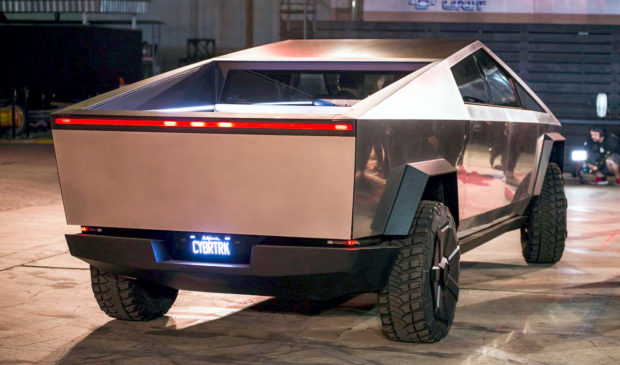Travis County considers 80% tax break to coax Tesla
Wednesday, June 24, 2020 by
Jessi Devenyns Electric vehicle company Tesla is considering moving to southeastern Travis County to build its “Gigafactory” where it will construct its much-hyped Cybertruck.
To entice the California company to make its home in Texas, Travis County is proposing giving the company an 80 percent rebate on its property taxes for the first 10 years of its residency followed by a 65 percent rebate for the following 10 years. In dollars, that translates to a $14.6 million rebate for Tesla, leaving $7 million for the county to collect on an annual basis.
Although the company has not committed to constructing its factory in the region, Tesla spokesperson Rohan Patel told the Commissioners Court on June 23 that Austin has “risen to the top in our search.” He said “the incentives here in Texas and Travis County would not be a reason for us to choose this location … but they are a prerequisite to make the economics of this factory work.” He said other locations the company is considering have offered to completely eliminate property taxes for 20 years.
Yvonne Flores, the president of AFSCME Local 1624, called Tesla’s request for such substantial subsidies amid a pandemic and an economic recession “simply unfathomable.”
The large property tax rebate that Travis County is contemplating will not disappear entirely into Tesla’s coffers. As part of the incentive deal, the county will require Tesla to reinvest at least 10 percent of its rebated tax dollars into local workforce programs, such as Workforce Solutions Capital Area, Austin Community College and Travis County Justice Planning to create a pipeline of residents needing middle-skill jobs.
The Tesla Gigafactory is estimated to bring 5,000 jobs, 65 percent of which will be unskilled labor.
As part of the deal with the county, Tesla is committed to a $15-per-hour or $31,200-per-year wage floor; the corporation estimates the average annual salary will be $47,147. Data from the MIT living wage calculator shows a living wage for a family of four in Travis County is $57,200.
“At the pay of $47,000 … I don’t think that would come close to (workers) being able to afford buying a house,” Commissioner Margaret Gómez said. Patel noted that the amount of land Tesla is considering purchasing is in excess of what is necessary to build a factory. He said the additional acreage could potentially be used to build affordable housing in the future.
Travis County resident Susan Moffett told commissioners that instead of offering subsidies for wages, “which would have sounded great in 1985,” the county can reinvest them in affordable housing options for residents.
To supplement the commissioners’ questions about whether $15 an hour constitutes a livable wage, nearly 50 community members called in to express their opinions. Although dozens of callers were in favor of the project, the majority asked the county to reconsider offering such a generous incentive package to the Fortune 500 company.
In addition to the people who called in, Diana Ramirez, the director of Economic Development for the county’s Planning and Budget Office, told commissioners that by noon on Tuesday she had received 190 emails in support of the incentive agreement and 60 that were opposed.
Many callers pointed to Tesla’s track record of violating the terms of its subsidy agreements with other municipalities as a reason not to offer such a package to the electric car maker.
In May, the company asked the city of Buffalo, New York, for a one-year waiver from its commitment to create 1,500 jobs it had promised in return for the subsidies the city provided. The penalty for violating the terms was $41.2 million. The company also has nearly three times as many federal OSHA fines as the top 10 auto manufacturers in the United States, according to Forbes. Most recently, Tesla sued Alameda County, where its California factory is located, for shutting down its manufacturing operations due to coronavirus concerns. The company later dropped its lawsuit.
In addition to the county incentives, the factory could also receive incentives from the Del Valle school district worth an estimated $50 million in property taxes over 10 years, as reported by the Austin American-Statesman.
After hearing over two hours of testimony, the Commissioners Court closed the public hearing and did not take any action. The item will come back next week, and County Judge Sam Biscoe said the commissioners may vote on the incentive package on that date.
Photo by u/Kruzat, modified by Smnt/CC BY-SA.
The Austin Monitor’s work is made possible by donations from the community. Though our reporting covers donors from time to time, we are careful to keep business and editorial efforts separate while maintaining transparency. A complete list of donors is available here, and our code of ethics is explained here.
You're a community leader
And we’re honored you look to us for serious, in-depth news. You know a strong community needs local and dedicated watchdog reporting. We’re here for you and that won’t change. Now will you take the powerful next step and support our nonprofit news organization?









